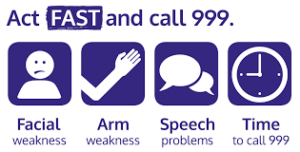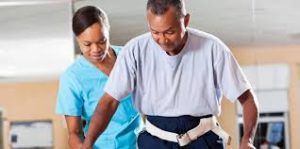What is a stroke?
A stroke is a very sudden attack on your brain. The blood supply to any part of your brain is interrupted, preventing brain tissue from getting enough oxygen. If this happens, brain cells start to die in minutes which is why it is always a medical emergency and getting treatment quickly is crucial.
A stroke can occur at any age but is known to be more common in men and people over the age of 55. Having a family history can increase your risk too, as can other lifestyle factors.
What are the symptoms/ first signs of a stroke?

Using the word FAST will enable you to detect if someone is having a stroke:
- FACE – has one side of their mouth dropped
- ARMS – are they able to lift both arms
- SPEECH – are they slurring their words, and can they understand you?
- TIME – if you see any one of these signs it is vital that you call 999
Other signs may be:
- Vision affected in one or both eyes
- A severe headache with dizziness
- Trouble walking
- Numbness or weakness of the face, arm or leg, especially on one side of the body
- Trouble speaking and being understood
- Confusion
What are the main causes of having a stroke?
There are two main causes of stroke, either a blocked artery (ischaemic stroke) or a burst blood vessel (haemorrhagic stroke).
- Ischaemic Stroke – this is the most common type of stroke. It can happen when the brain’s blood vessels become blocked and severely reduce the blood flow to your brain.
- Haemorrhagic Stroke – This happens when a blood vessel in your brain ruptures or leaks.
Transient ischaemic attack (TIA)
This is sometimes called a mini-stroke. You will have a period of symptoms which mimic a stroke. A transient ischaemic attack will not cause permanent damage. The reason you may get a transient ischaemic attack is because there has been a temporary decrease in blood supply to part of your brain. This may only last for as little as five minutes.
A transient ischaemic attack needs immediate emergency care so please call the emergency services as soon as possible. Having a transient ischaemic attack does increase your risk in the future of having a stroke.
What are the risk factors to having a stroke or transient ischaemic attack?
There are various reasons why one may suffer with a transient ischaemic attack and as you age your arteries become naturally narrower. But there are certain factors that can certainly speed up this process. These include:
- Smoking
- Obesity
- High blood pressure
- Diabetes
- High levels of cholesterol
- Excessive alcohol consumption
- An irregular heartbeat (atrial fibrillation)
Who is most at risk of having a stroke or transient ischaemic attack?
- Age – it can happen at any age but it is more common in over 50’s
- Ethnicity – people from southern Asia, Africa or the Caribbean tend to have a higher risk as diabetes and high blood pressure are more prevalent in these groups
- Medical history – if you have other conditions as mentioned above
- Being overweight – you are at more risk if you are overweight and have a diet high in fat and salt
- Smoking and alcohol – either of these can increase your risk
Do people recover from strokes?
Yes. People can recover very well from a stroke although it can be a lengthy process that will require hard work and dedication.
As strokes can cause major impairment to your language skills, cognition, sensory, and motor skills, it is essential to start rehabilitation as soon as possible. This will increase your chances of regaining brain and body functions.
After being discharged from hospital you may go to a rehabilitation centre or be sent home to recover. Your doctor will take the following into account: lifestyle, overall health, and whether you have family or friends to help.
What type of treatment is available after you have a stroke?
Everyone will recover differently and with different timescales. Depending on your condition, your doctor and his team may ask for:
- You to be under the care of a neurologist
- A dietitian
- Physiotherapy
- Occupational therapy
- Speech therapy
How can physiotherapy help someone who has had a stroke
Recovering from a stroke requires time, expertise and patience. Physiotherapy plays a vital role in the recovery following a stroke. After receiving a detailed assessment, your physiotherapist will plan a rehabilitation programme taking into account all your problems. They will sit down with you to work out realistic goals, both short- and long-term.

Treatment will include balance, strengthening, and mobility exercises. Your physiotherapist will help you relearn how to sit, stand, walk, and return to everyday activities that you have been finding hard.
If you experience muscle spasms, you will be given stretching exercises and shown relaxation techniques to control symptoms.
It must be considered that that stroke recovery is dependent on a number of factors such as: the severity of the stroke, the age of the individual, the impact it has had, and the willingness one has to succeed. With this in mind, it is recommended that ALL individuals should have rehab for at least the first six months after a stroke as this is when the most progress is made.
